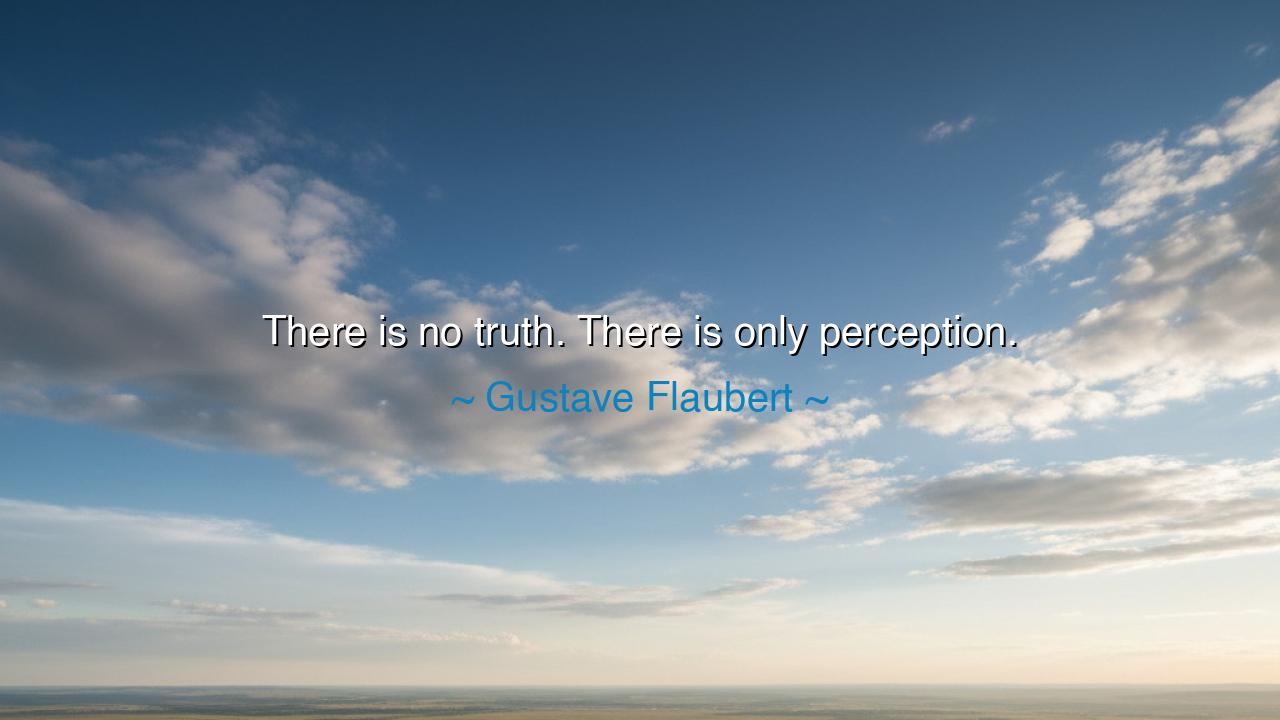
There is no truth. There is only perception.






Hear the voice of Gustave Flaubert, the great novelist of France, who once declared: “There is no truth. There is only perception.” These words strike like thunder against the proud temples of certainty. For what is truth, but a flame glimpsed through veils of mist? Each man beholds it from his own vantage, and the flame appears different to every eye. What one calls light, another may call shadow; what one praises as virtue, another condemns as folly. Thus Flaubert reminds us that reality is not a single, unchanging pillar, but a shifting landscape, seen through the colored glass of perception.
The ancients themselves wrestled with this mystery. Protagoras, the sophist, once said, “Man is the measure of all things.” By this he meant that truth is not absolute, but shaped by the one who perceives it. To a man standing upon the shore, the sea may appear calm and peaceful; but to the sailor caught in its depths, it may be a raging terror. Which view is the truth? Both, and neither. For truth, in its pure form, may belong only to the gods, while mortals must content themselves with perception.
Let us turn to history for a lesson. During the trial of Galileo, the earth itself stood as witness. Galileo proclaimed that it moved around the sun, yet the rulers of his time declared otherwise. To the Church, his words threatened the order of heaven; to Galileo, they were the clear song of reason. Here, perception clashed with perception. Was there truth? Yes, but men could not grasp it without the chains of their own belief. The truth was hidden until time and understanding shifted human sight. Flaubert’s words echo here: truth lies beyond reach, while perception rules in the hearts of men.
This teaching is not meant to plunge us into despair, but to awaken humility. If all is perception, then let us not wage war upon another’s view without first seeking to understand it. What we see is not the whole, but a fragment. To live wisely is to know that one’s own vision is limited, and that others, too, carry their own fragments of the greater mosaic. Only together, in the weaving of many perceptions, may we approach something close to truth.
Yet beware, for perception is both a gift and a snare. It gives shape to our lives, but it can also blind us. Prejudice, fear, pride—these can twist perception into chains that bind the mind. The wise must constantly examine their own sight, asking: “Do I see clearly, or do I see through the smoke of my own desire?” This is the discipline of the seeker, the labor of one who refuses to live in illusion.
Therefore, the lesson for us is this: walk in humility, knowing that your perception is not the whole of reality. Seek to broaden your vision by listening to others, by reading widely, by contemplating deeply. When you encounter conflict, do not cry, “I hold the truth!” Instead say, “This is how I perceive, but tell me, how do you perceive?” In such dialogue lies the seed of wisdom.
Practical actions arise from this. Pause before judgment. Question your assumptions. Seek voices unlike your own, for they will reveal to you angles of the world you had not seen. In your work, your family, your community, remember that perception shapes all things—so shape your own with care. Cultivate clarity through reflection, humility through listening, and courage through the acceptance of uncertainty.
And so, let Flaubert’s words remain with you, carved in the stone of memory: “There is no truth. There is only perception.” Accept this not as despair, but as liberation. For though absolute truth may lie beyond our grasp, the richness of perception gives us infinite ways to learn, to grow, and to walk closer to the eternal mystery.






NPNek Phuongg
I find Flaubert’s quote to be both liberating and unsettling. If truth is just perception, then it makes me question everything I’ve been taught to believe. Is there any way to differentiate between what’s truly real and what we’ve only imagined or assumed? Does this mean that truth is always relative, or can we still strive for an objective reality despite the subjective nature of perception?
CHChau Huynh
Flaubert’s perspective is thought-provoking because it suggests that truth may be an illusion. If perception is all we have, how do we know if what we’re experiencing is the same as what others perceive? Can we ever truly understand someone else’s perspective? What happens when two people’s perceptions of the same event are completely different—does that mean the truth is subjective, or is one person’s perception more valid than the other?
TLTruc linh
This quote makes me wonder if truth is something that’s ever truly attainable. If all we have are perceptions, does that mean reality is fluid and constantly changing depending on who’s observing it? Can we ever truly know anything for certain, or are we just constructing our own versions of reality? How much of what we consider truth is simply influenced by our personal experiences and biases?
TTam
Flaubert’s quote really challenges the idea of objective truth. If there’s no absolute truth, does that mean everything we believe is subjective? How do we navigate a world where everyone’s perception is different? Can we ever reach a common understanding of reality, or are we all just living in our own truths? How much does perception shape the way we experience and interpret the world around us?